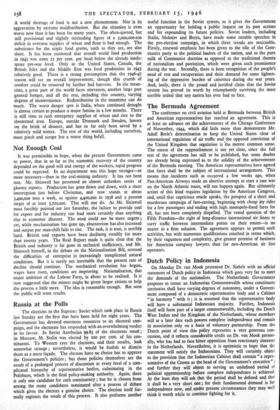Not Enough Coal
It was permissible to hope, when the present Government came to power, that in so far as the economic recovery of the country depended on the good will and energy of the workers, rapid progress could be expected. In no department was this hope stronger—or more necessary—than in the coal-mining industry. It has not been met. Mr. Shinwell has presented an almost unbroken series of gloomy reports. Production has gone down and down, with a short interruption just before Christmas, and now stands at about 3,400,000 tons a week, as against 4,400,000 in 1938 and a present target of at least 3,700,000. This will not do. As Mr. Shinwell most forcibly pointed out last Saturday, the failure to provide coal for export and for industry can lead more certainly than anything else to economic disaster. The need could not be more urgent ; yet, while mechanisation has gone up, absenteeism has also increased and output per man-shift fails to rise. The task, it is true, is terribly hard. British coal exports have been declining steadily for more than twenty years. The Reid Report made it quite clear that the British coal industry is far gone in technical inefficiency, and Mr. Shinwell himself, in the debate on the Nationalisation Bill, stressed the difficulties of enterprise in increasingly complicated natural conditions. But it is surely not inevitable that the present rate of decline should continue. The mechanical revolution has begun, wages have risen, conditions are improving. Nationalisation, that major ambition of the Labour Party, is about to be realised. It is now suggested that the miners might be given larger rations to help the process a little more. The idea is reasonable enough. But soon the public will want results.


























 Previous page
Previous page